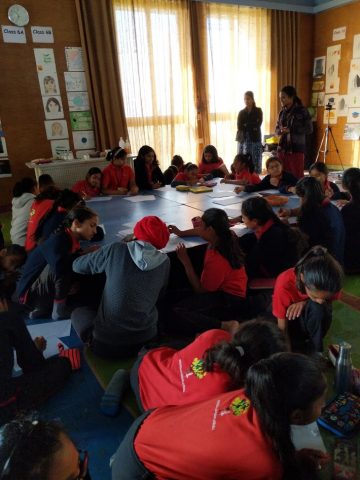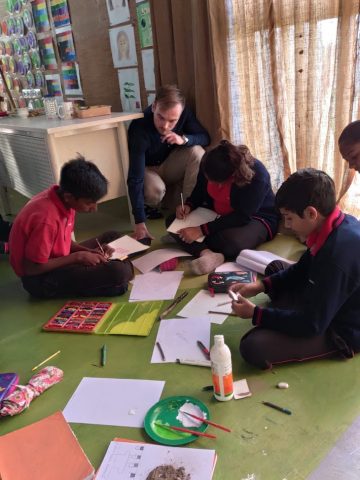Exploring Indian Schools and Exporting Finnish Education 2/2
This blog post is written by three Finnish Master´s Degree Programme in Teacher Education students who study at Tampere University in Finland. Learning Scoop made the internship possible by matching a great Indian school Redbricks Education Foundation with enthusiastic students from Tampere University. Blog post 1/2 can be read here.
 First of all, according to our sightings lesson plans were ultimately precise and they defined word for word what teacher must say, write, ask and do in the classroom. Secondly, the amount of teaching content was normally vast and therefore teachers didn’t have enough time to accomplish their lesson plans. That created a sense of rush and it felt that teachers just wanted to go through the lesson plans as fast as they could. Third issue related to lesson planning was that some of the plans were “locked or frozen” for five years which meant that the plans will remain almost the same for a long time. Of course, teachers must go through lesson plans every year and before every lesson but if a teacher wants to do some changes to the original plan one must ask permission for that from subject leaders.
First of all, according to our sightings lesson plans were ultimately precise and they defined word for word what teacher must say, write, ask and do in the classroom. Secondly, the amount of teaching content was normally vast and therefore teachers didn’t have enough time to accomplish their lesson plans. That created a sense of rush and it felt that teachers just wanted to go through the lesson plans as fast as they could. Third issue related to lesson planning was that some of the plans were “locked or frozen” for five years which meant that the plans will remain almost the same for a long time. Of course, teachers must go through lesson plans every year and before every lesson but if a teacher wants to do some changes to the original plan one must ask permission for that from subject leaders.
At this point we must underline, that thoroughly designed lesson plans make a teacher’s life easier and especially at Redbricks school lesson plans looked very good on paper in terms of pedagogical ideas and approaches.
It was also nice to hear that unit and lesson plans were created in cooperation with subject teachers and subject leaders, so every teacher is a part of planning process.
Still there are some issues with this sort of lesson planning if you consider real life teaching situations.
Teacher’s sense of autonomy and professional development were some of the observations that we found. As we said, some of the lesson plans had really detailed guidelines for teachers and had too much educational content. Every teacher knows that there are always unexpected surprises in a classroom and normally things won’t go according to their original plans.
 On a paper an individual lesson lasts 40 minutes but in the real life the time for teaching is so much shorter and therefore fully packed lesson plans can have bad consequences. That creates a sense of urgency and probably increases teachers’ stress due to not being able to teach all the contents of the lesson plan. These sort of lesson plans don’t have time for in-depth interaction with students because the main focus is on teaching contents. Reacting to varying social situations during a school day and establishing good emotional relationship with students is an integral part of teaching and hence inflexible plans are problematic.
On a paper an individual lesson lasts 40 minutes but in the real life the time for teaching is so much shorter and therefore fully packed lesson plans can have bad consequences. That creates a sense of urgency and probably increases teachers’ stress due to not being able to teach all the contents of the lesson plan. These sort of lesson plans don’t have time for in-depth interaction with students because the main focus is on teaching contents. Reacting to varying social situations during a school day and establishing good emotional relationship with students is an integral part of teaching and hence inflexible plans are problematic.
On top of other aspects, strict guidelines can have harmful effects on a teacher’s professional development and creativity. You don’t have to use your individual reflective or creative thinking so much if you just follow the plan, especially if you have “locked” and word for word lesson plans made almost ready for you. In our opinion creative and reflective practices enable professional development and therefore it is essential to consider also these aspects.
Management culture and requirements for lesson plans are not that standardized in Finnish schools and teachers can plan and implement their lessons more autonomously. This is also an ambiguity issue. On the one hand, we certainly think that it is functional and sensible that teachers in Finland have freedom to make their own lesson plans, use their creativity and provide personality-dependent teaching for their students. This is possible because of our five-year research based and top-quality teacher training.
 According to many researchers, a sense of autonomy increases motivation and increases well-being at work. On the other hand, extensive professional autonomy brings also many responsibilities and at the moment many teachers in Finland are suffering from work-related stress because of enormous workloads.
According to many researchers, a sense of autonomy increases motivation and increases well-being at work. On the other hand, extensive professional autonomy brings also many responsibilities and at the moment many teachers in Finland are suffering from work-related stress because of enormous workloads.
In conclusion, we totally understand why lesson plans are so strict, thorough and standardized in some Indian schools. The aim is to provide the best possible education for students and therefore it was delightful to see that there is such a strong emphasis on planning. If the quality of teacher training is lacking, school leaders cannot give so much responsibility or autonomy to their teachers and therefore guidelines for teaching must be more specific.
During our stay we truly realized that the “secret” of Finnish Education system is based on our high-quality teacher training system which is research based and really versatile. The development of any school or school system starts from teacher training and besides training provided by higher education institutions there should be strong emphasis on life-long learning and continuous training in schools. If schools have highly skilled teachers with great professional knowledge, it is possible to give more autonomy to them and be sure that teachers can still provide high-quality teaching.
Jere Riekkinen, Nestori Kilpi and Riku Oras
Master´s Degree Programme in Teacher Education Students
Tampere University

